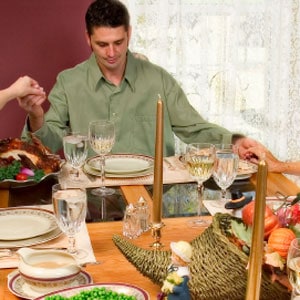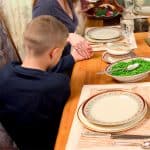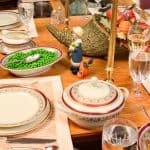
A Recipe for Family Traditions
On today's broadcast, Dennis and Barbara Rainey talk about some of the Rainey Thanksgiving traditions that set the day apart from all other holidays.
Show Notes
About the Host
About the Guest
-
On today's broadcast, Dennis and Barbara Rainey talk about some of the Rainey Thanksgiving traditions that set the day apart from all other holidays.
-
Dave and Ann Wilson
Dave and Ann Wilson are hosts of FamilyLife Today®, FamilyLife’s nationally-syndicated radio program. Dave and Ann have been married for more than 38 years and have spent the last 33 teaching and mentoring couples and parents across the country. They have been featured speakers at FamilyLife’s Weekend to Remember® marriage getaway since 1993 and have also hosted their own marriage conferences across the country. Cofounders of Kensington Church—a national, multicampus church that hosts more than 14,000 visitors every weekend—the Wilsons are the creative force behind DVD teaching series Rock Your Marriage and The Survival Guide To Parenting, as well as authors of the recently released book Vertical Marriage (Zondervan, 2019). Dave is a graduate of the International School of Theology, where he received a Master of Divinity degree. A Ball State University Hall of Fame quarterback, Dave served the Detroit Lions as chaplain for 33 years. Ann attended the University of Kentucky. She has been active alongside Dave in ministry as a speaker, writer, small-group leader, and mentor to countless wives of professional athletes. The Wilsons live in the Detroit area. They have three grown sons, CJ, Austin, and Cody, three daughters-in-law, and a growing number of grandchildren.
-

Dennis and Barbara Rainey
Dennis and Barbara Rainey cofounded FamilyLife®, a ministry of Cru®. Their 43+ years of leadership enabled FamilyLife to grow into a dynamic and vital ministry in more than 109 countries. Together they have spoken at over 150 Weekend to Remember® marriage getaways and authored or co-authored more than 35 books, including best-selling Moments Together for Couples, Staying Close, A Symphony in the Dark, and Barbara’s most recent, Letters to My Daughters: The Art of Being a Wife...more
The Raineys talk about some of the Rainey Thanksgiving traditions that set the day apart from all other holidays.
A Recipe for Family Traditions
Bob: One of our favorite holiday movies is the Irving Berlin movie, "Holiday Inn," and there's a scene where a lonely, depressed Bing Crosby is seated at the Thanksgiving table with turkey, mashed potatoes, all the trimmings, and he's a little melancholy.
[Bing Crosby singing, "I've Got Plenty to be Thankful For"]
Bob: This is FamilyLife Today for Thursday, November 1st. Our host is the president of FamilyLife, Dennis Rainey, and I'm Bob Lepine. We've got some family Thanksgiving traditions in store for you today that would lift even Bing Crosby's spirits. Stay with us.
And welcome to FamilyLife Today, thanks for joining us on the Thursday edition. Three weeks from Thanksgiving, it will be Thanksgiving three weeks from today, and we're going to be talking to some parents today who – I think, if the Children's Protective Services knew that these parents forced their children to wait for Thanksgiving dinner until they had listened to the Thanksgiving story and had to write on cards and do all kinds of assignments, these parents could have been locked up. It's cruel – was the turkey sitting there just cooling while you …
Dennis: No, no, it wasn't turkey. We actually did our Thanksgiving celebration before – a brunch …
Bob: … oh, around brunch …
Dennis: … it was Barbara's Company French Toast …
Bob: … oh, the famous French toast recipe.
Dennis: That's right, and if folks want to get the French toast recipe, they can get that online at FamilyLife.com. We'll let them go and visit that. But Barbara would prepare that the night before, and we would walk into the dining room, and I've got a picture, Bob, you can kind of see it here. This is after the food arrives, but she would set the table in a magnificent fashion with each plate having five kernels of corn on it, and then the family would be allowed to come in and sit down, and then before we did anything, she would read stories about the pilgrims, all the way from setting sail on the Mayflower to when they set up their colony and began to attempt to survive that first winter in New England.
Bob: Barbara is back with us today on the program. You actually have taken those stories you used to read and kind of rewritten them all to synthesize the story into one, and it's now in a book called, "Thanksgiving, a Time To Remember," and it's designed to be read aloud at Thanksgiving time, right?
Barbara: That's right. I'm really hoping that this book will be a book that will become a tradition, much like at Christmas every year when families read the Christmas story. They read the Gospel of Luke and talk about Christ's birth, and I'm hoping that in a similar way, the story of the pilgrims will be read every year at Thanksgiving in families, and we will be reminded every year of what they gave us and what their faith produced in our country.
Bob: We forget about the fact that this is a uniquely American holiday …
Barbara: … that's right …
Bob: … nobody in Canada is going to be celebrating Thanksgiving – I don't think they celebrate it in Canada or in Mexico or other places around the world, do they?
Barbara: I've heard that they have something in Canada, but it's not the same time of the year, and I do think that it is uniquely American.
Bob: I'm looking at this picture you had of the table …
Barbara: That's not very accurate, Bob.
Bob: Is Benjamin dressed in his camo? Is that what that is?
Dennis: Well, we could have been hunting that morning.
Bob: Is it possible that the …
Barbara: … it's very possible.
Bob: The men go hunting on Thanksgiving Day?
Barbara: No, no, no, no – what this was is this was a re-creation, because we forgot the camera that Thanksgiving Day, and so this was later on over the weekend, and we wanted to get a picture of everybody, so we re-created our table, and that's why Benjamin has on camo.
Bob: Would Dennis and the boys be allowed to the field to hunt on Thanksgiving Day?
Barbara: No, they usually don't go on Thanksgiving morning. That's sort of a no-no, because it cuts into our family time, and so they can go before – I mean, on Monday through Wednesday, they can go Friday and Saturday, but on Thursday, they don't go hunting.
Bob: And that's okay with you and the boys, isn't it?
Dennis: Of course.
Bob: No problem.
Barbara: We had to negotiate, but he finally agreed.
Dennis: The whole celebrating process is one long – well, it's one long communication process of learning what to expect. I wrote down, on a 3x5 card, what I observed the kids doing as Barbara was reading the Thanksgiving story.
Bob: When did you write this?
Dennis: You know, I wish I would have dated this card, because I have no idea, but apparently the children were younger, because they were griping and angry about the juice. One person was ticked off that her brother had stolen a brush, the other one said, "Mine, too," "I'm hungry," "I am not griping." Then one child, and I'll protect her identity since we only have four daughters, her lower lip was puckered out because Barbara would not let her read, probably because she couldn't read at that point.
We stopped in the middle of it and prayed, because there was so much chaos. In the middle of Barbara's reading, one child had his face down in the plate, and the other one was dropping the five kernels of corn on the plate and bouncing them, another child was walking and leaving the table, which we had to say, "Come back and sit down." They said, and these are quotes, "Let me play the piano," "Let me read my journal," "Let me read a book," "Would you show me the picture?"
Now, if this doesn't remove any …
Bob: … any pretense …
Dennis: … yeah, of Norman Rockwell, I mean, of this idyllic family that's sitting down and everyone is dutifully listening to Mom as she reads the story, it just never happened that way.
Bob: There had to be days, Barbara, when you said, "Okay, we're never doing this again. I'm not reading this story next year. We're just going to have the food, and I'm sick of this, because they're not paying any attention. It's not getting through to them. They gripe in the middle of Thanksgiving." Has that ever happened?
Barbara: I was pretty persistent on this, because this was kind of my area. It was my objective to teach my kids to be thankful and to help them understand the Thanksgiving story. So I was going to do it every year, regardless. But last year, because we were going to be having some extra people that year for our Thanksgiving Day meal, and we had two little grandkids, and they weren't going to be taking naps during the time of the reading, and I said to Laura, "Maybe we ought to just skip the story this year. It's going to be kind of crazy around here," and she was stunned that I would say that, and she said, "We can't skip the story. That's tradition. We do it every year." And I said, "Really?" I said, "Do you enjoy it?" And she said, "Yeah, we have to have the story." So I had my attempt at cutting it out, and the kids said no.
Bob: That's encouraging, isn't it?
Barbara: So we're back to where we were when we started. We now have little kids sitting at the table, and so last Thanksgiving little Samuel, who was two-and-a-half, was sitting there scribbling and knocking things and making noise, and I remember looking around the table thinking, "Is anybody going to be able to hear anything I'm saying?" So we're back to where we started.
Bob: Now, help me again with the chronology of the day. We've already established that no one can go hunting that morning. Everybody has to stay around the house.
Dennis: Why do you keep saying this as a matter of record, Bob?
Bob: I'm just trying to make sure that …
Dennis: … I don't go hunting …
Bob: … that this Thanksgiving you're where you're supposed to be. What time is brunch served?
Barbara: Oh, usually, we eat about 10. So everybody gets up, and if we don't have the table set the night before, I get the girls busy on setting the table, and we usually try to sit down at 9 so we have plenty of time, but we stick the egg casserole and the French toast and all the stuff that has to bake is in the oven baking while we're reading the story.
Bob: And so you sit down at 9 and plan to eat at 10?
Barbara: Approximately.
Bob: So you've got an hour of being hungry and sitting at the breakfast table?
Barbara: Approximately.
Bob: Okay, and what do you do during that hour?
Barbara: It doesn't always work quite like that, you know, but that's the goal.
Bob: What do you do during that hour?
Barbara: Well, I read the story and sometimes in order to keep it moving, I would mark certain sections ahead of time, and I would pass the book, and I would ask a child, who is a teenager or junior high, who could read fairly well and say, "Okay, I want you to read this section," or "I want you to read that section," and because we've done it for a number of years, they know that we're going to also record things that we're thankful for. So I assume that they could even be sitting there thinking about what they're thankful for, too, but primarily the goal is to sit and listen to the pilgrim's story.
Dennis: And I think it's important for our listeners to know why you, as a mom, think it's so important for our children to hear the story of the pilgrims.
Barbara: Well, I think, like anything else, repetition is a great teacher. So the more you hear something, the more you can remember it, the more you're going to enjoy it. It's going to become a tradition that the kids feel like they have to have, and that's always a benefit when you're trying to be a leader in the family and do something for the kids.
But the primary reason is that listening to the pilgrim's story is an occasion for our kids to be thankful, and for them to compare their lives, the ease in which we live in this century, with the hardship that the pilgrims endured and to compare the two and say, "Boy, God has really been good to me. I have so much to be thankful for" – so that the ultimate goal is for our children to understand the pilgrim's story and to become thankful and to be grateful.
Bob: In the book that you've written, you've told the Pilgrim story from the beginning, from the Mayflower all the way through the second Thanksgiving celebration, and it can be read, actually, in two different versions. One takes about a half an hour, the other takes about 45 minutes, right?
Barbara: Right, right.
Bob: And so if you want the whole story with all the details, you read through everything.
Barbara Everything.
Bob: If you want the shorter version, the abridged story, you read just the big print, right?
Barbara: Correct, correct.
Bob: And did you ever have – was there discussion following the story. After you were done reading, did you say, "Okay, I'll go get the casseroles, and we'll eat," or did you talk about it at all?
Barbara Well, we never really had lengthy discussion but every once in a while someone would make a comment, you know, "I just can't believe what they went through. I just can't believe what they endured." And when we would talk about even at other times other than Thanksgiving, it's amazing what the kids remember, because there are some great stories in there that kids can latch onto, even really young children can listen to and be captivated by because they're so dramatic and so the stories are what's going to sink into the attention of a child and stick there.
Bob: When the story is done, before the food is served, everybody gets a card, and this is something you started back when your kids were just real tiny, right?
Barbara: Yeah, the first ones that I have are from about 1987, is my best guess, because I didn't date them, but our youngest was about two, and because she couldn't write yet, I have written – it's just a piece of notebook paper, and it's got scribbles all over it. I put her name on it, and then I remember asking her, "Laura, what are you thankful for?" And she told me, and I wrote her words on that paper because she couldn't write.
Bob: Do you have it here?
Barbara: Yeah, I have it. I've got all of these cards in an envelope that I've been collecting.
Bob: There's pink and blue and …
Barbara: … pink and blue and green.
Bob: Lots of crayons.
Dennis: Yeah, she wasn't into spelling yet.
Barbara: No, she was definitely not into spelling. She was about two or two-and-a-half, and this is what Laura said – "I'm thankful" – and these are her words – "thankful for Mimi died and for John and Laurie." Mimi was my grandmother, which would have been her great-grandmother, and she had just recently died, and we had just been to the funeral a week before, so that was real fresh in her memory of a two-and-a-half-year-old, and so that was the first thing she said, "Thankful for Mimi died and for Daddy and Jesus, for Benjamin and Samuel, for my presents, for my home and my blankie" – two-and-a-half, and that's what she wrote.
Bob: Where did you get the idea of doing this back in 1987?
Barbara: Well, I don't know that '87 was the very first year I did it. It could have been, maybe, the second or third, but what I did start to do is have the kids share what they were thankful for, and then it occurred to me, "I need to have them write down what they're thankful for." So this is the first year I have their written responses to what they were thankful for, but I wanted them to put it on paper and to have to tangibly write what they were thankful for that year.
Bob: Some years you did it on placecards. They just wrote on the back of their little placecard what they were thankful for.
Barbara Again, there wasn't a system. I didn't have this all thought through when we started it. It wasn't well-oiled and well prepared. I just wanted my kids to be thankful, and I wanted them to record on paper what they were grateful for, and it sort of has evolved from notebook paper and coloring book paper to really nice cards. So we've sort of grown as we've gone through this process.
Bob: Is the expectation that this celebration continue, and this family time wil – that they're going to be here?
Barbara: Well, if I had to choose a holiday, it would be this one, and we haven't all been together, but my real hope is that they will do this with their family. As long as we can, as many times as they can come home to be with us, and we can do it together, that would be wonderful, but I'm realistic enough to know that that's not going to happen forever, so I just hope they will continue it with their families.
Bob: Dennis, the year Benjamin was in Estonia was the first time, I think, that the family wasn't all together at Thanksgiving, but he sent an e-mail, didn't he?
Dennis: He actually sent seven e-mails – one to each family member, and each e-mail was a tribute of sorts, and we don't have time to read all seven of them, but after we'd gone all the way around the table and each person had shared the five things they were thankful for that year, I remember we all went into the computer, because he had sent this through an e-mail, and we all gathered around the computer and just cried.
I'm just going to read one that he wrote to his brother, and I think I picked this out because we figured that they would hate each other for the rest of their lives because of how they beat on one another their entire childhood years.
But he writes this: "Samuel, my little brother I used to beat up on all the time, and he would go crying to Mom, and then I'd have to re-stripe the parking lot out front or eat dirt and leaves for a month. You have turned into a mighty man of God, a heart of gold, a man of purity and devotion. You are a man after the very heart of God, and I admire that in you.
Well, Bob, you start reading this, and it's like, "Now, wait a second" –
Bob: Who wrote that for you?
Dennis: That's right, is this a ghost writer? I mean, these are the two boys – can you believe this is happening? And you're just looking at the smile on Samuel's face. It was really a classic moment. He goes on – "There are many things that I wish I had in my life that you have in such abundance – your compassion, your listening ear, your love for all, and your ease with people, your heart for others, your heart for God and the things of His kingdom, your eternal focus, your perspective on life, your perseverance, I could go on and on. You are simply the man, and I truly and honestly look up to you. You are a true inspiration to me. Bro, there have been many times that I have asked the Lord to give me your MD" …
Bob: … that's a reference to his muscular dystrophy…
Dennis: … that's right – but I think He knows better. He knows that I couldn't handle it. You persevere and keep going with such grace and determination that I know our Father in heaven is pleased. He receives glory from your life, and I am grateful that I have had the wonderful opportunity to share in your life for 19 years.
I look forward to the next 19 years and more that God would truly bless our friendship and that lives would be changed as a result. You are my brother, and my Lord and King has graced me and blessed me with you. For that He is worthy of praise and honor. My feeble words fail trying to let you know how much I love you, so I'll use someone else's. John 15:12 – 'Greater love hath no one than this than he lay down his life for his friend.' My life is yours. I would do anything for you. I pray that verse would be an expression of my love for you. Serving the Lord with you, preaching His word, and advancing His kingdom, Benjamin. Thanksgiving 1997, Tallin, Estonia."
Bob: You know, you listen back to those words, even now, and you go – it didn't all happen perfectly but something happened, didn't it, Barbara?
Barbara: It did, and to be able to review what our kids have written – for us, if for nobody else, is a real treasure. It's a piece of the reward for persevering in parenting, and our kids are far from perfect, and they have a long way to go, but it's encouraging when we hear them giving thanks and when we hear them viewing life in the right perspective, and Thanksgiving Day is an opportunity to do that – to put everything in perspective and to remember what we've been given and to be grateful for it, and it's a privilege to be able to do that.
Bob: Yeah, and I think, as parents, we've got to recognize that we've got to be intentional, we've got an opportunity presented to us on this day, and we can let it pass like any other holiday and have food and watch football and call it a day, or we can be intentional and be purposeful about cultivating the right kind of heart in our children, and one way we do that is by exposing them to the heart of others who were thankful for much less, for far less than we have.
And that's a part of what you do in the book, "Thanksgiving, a Time to Remember." It tells the story of the pilgrims from the Mayflower all the way through their second Thanksgiving celebration, and you have designed it in a way that it can be shared and read as a part of the Thanksgiving celebration or in the days leading up to Thanksgiving.
In fact, our team also worked to have your book produced as an audiobook, and I think it turned out to be very good. We ought to play for our listeners, this is just a portion of the audiobook, and this is after the pilgrims have gone through the first very difficult winter in America.
Narrator: With the days lengthening and the temperatures warming, the pilgrims turned their attention to planting the crops, desperately needed if they were to survive a second winter in America.
But they were interrupted by the reappearance of their new friend, Samoset, who arrived at the settlement with five Indians. Though the pilgrims didn't know it at the time, one of these Indians would play perhaps the largest role in the survival of New England. Bradford wrote of him that he was a special instrument sent of God for their good beyond their expectation. His name was Tisquantum, or Squanto, for short.
Bob: Then the story goes on from that point to tell about Squanto, his background, and his history and how God used him in the life of the pilgrims. And, of course, we have copies both of the book and the audiobook of "Thanksgiving, a Time to Remember," in our FamilyLife Resource Center.
You can go on our website at FamilyLife.com, click the "Go" button that you see in the middle of the home page. It's a red button that says "Go." That will take you to the area of the site where there is more information about both the book and the audiobook of "Thanksgiving, a Time to Remember," and our team has decided this year that if you are interested in getting a copy of the hardback book, we'll send along a copy of the audiobook at not additional cost.
So you can either hang onto both of those or pass one along to a family member, a friend, a neighbor, as a Thanksgiving gift. Again, the details on our website at FamilyLife.com. Click the red button you see in the middle of the home page that says "Go," and that will take you to the area of the site where you can get all the information.
Or call us at 1-800-FLTODAY, that's 1-800-F-as-in-family, L-as-in-life, and then the word TODAY, and we'll have folks available who can answer any questions you have about these resources or make arrangements to have them sent out to you.
You know, next week we will be celebrating the 15th anniversary of the launch of this program. FamilyLife Today originally went on the air on a network of about 22 radio stations. That was back in 1992, and now, 15 years later, our program is heard in nearly 1,000 cities all across the country. It's heard worldwide on the Internet, and on selected radio stations around the globe. Over the past 15 years our commitment has been to try to provide practical biblical help for your marriage and for your family every day as we produce this program.
And I want to say a special thank you to those of you who have been financial partners with us in this effort. Your donations to the ministry of FamilyLife Today have made the last 15 years possible, and your ongoing support of this ministry will make the next months and years possible as well. We appreciate those of you who make donations to this ministry. We see you as partners with us in all that God is doing through the ministry of FamilyLife Today.
This week and next week, if you're able to help with a donation of any amount for the ministry of FamilyLife Today, we'd like to send you a thank you gift. It's a book called "While They Were Sleeping," and it's designed to provide parents with some specific guidance as we pray for our children. This book takes 12 different character qualities, and each week it gives you specific help as you pray for God to cultivate things like thankfulness in your child's heart, or integrity, honesty, other character qualities that all of us want to see God build into our children's lives.
If you'd like to receive a copy of the book, "While They Were Sleeping," you can request it when you make a donation of any amount this week. As you fill out the donation form on our website at FamilyLife.com, just write the world "sleep" in the keycode box on the donation form, and we'll know to send you a copy of this book. Or if you call 1-800-FLTODAY and make a donation over the phone, mention that you'd like the book, "While They Were Sleeping" and, again, we're happy to send it along to you as our way of saying thank you for your ongoing support of this ministry. We appreciate your generous giving.
Then tomorrow we want to talk about some of the specific spiritual themes we can reinforce as we celebrate Thanksgiving with our families beyond the subject of Thanksgiving, what are some of the other things that the Thanksgiving holiday gives us a great opportunity to talk about and to reinforce. We'll discuss that tomorrow. I hope you can be back with us for that.
I want to thank our engineer today, Keith Lynch, and our entire broadcast production team. On behalf of our host, Dennis Rainey, I'm Bob Lepine. We'll see you back next time for another edition of FamilyLife Today.
FamilyLife Today is a production of FamilyLife of Little Rock, Arkansas, a ministry of Campus Crusade for Christ.
_______________________________________________________________
We are so happy to provide these transcripts for you. However, there is a cost to transcribe, create, and produce them for our website. If you've benefited from the broadcast transcripts, would you consider donating today to help defray the costs?
Copyright © FamilyLife. All rights reserved.
www.FamilyLife.com





